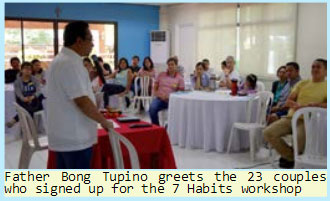CTK Mounts Workshop on Seven Habits of Highly Successful Families
 In celebration of the 11th Anniversary of the Parish’s Stewardship Program in September, Christ the King conducted the seminar-workshop on ‘The Seven Habits of Highly Successful Families’ over two full Saturdays, September 17 and September 24. Facilitators for the workshop were CTK parishioners Rene and Consy Montemayor of the Center for Leadership and Change, Inc. (CLCI), the authorized partner of Franklin Covey Co. in the Philippines based at the Ateneo Professional Schools in Makati.
In celebration of the 11th Anniversary of the Parish’s Stewardship Program in September, Christ the King conducted the seminar-workshop on ‘The Seven Habits of Highly Successful Families’ over two full Saturdays, September 17 and September 24. Facilitators for the workshop were CTK parishioners Rene and Consy Montemayor of the Center for Leadership and Change, Inc. (CLCI), the authorized partner of Franklin Covey Co. in the Philippines based at the Ateneo Professional Schools in Makati.
The workshop, based on the New York Times best-seller ‘The 7 Habits of Highly Effective Families’ that was written by Stephen Covey, an internationally respected leadership authority, family expert, teacher, and organizational consultant who also wrote the earlier best-sellers ‘The 7 Habits of Highly Effective People’, ‘First Things First’, and ‘Principle Centered Leadership’, was well-attended, with 23 couples-families signing up right after it was first announced last August.
The workshop, which usually costs several thousand pesos, was staged at no cost to CTK, with participant couples or families being charged only P1,000 to cover the workbook cost.
 The book made waves when it was first released in 1997. With the same profound insight, simplicity, and practical wisdom that propelled The 7 Habits of Highly Effective People to worldwide acclaim, Stephen Covey focused on the primary concern of society today -the family. It is widely accepted that too many families are in trouble. In his book, Covey shows how families can move from a problem-solving to a creative mindset, focusing on accomplishing goals and contributing together in meaningful ways. He unveils a powerful framework of universal principles that enable family members to effectively communicate about their problems and resolve them. The objective is to build the kind of strong loving family that lasts for generations. As Covey says, “When you raise your children, you are also raising your grandchildren.”
The book made waves when it was first released in 1997. With the same profound insight, simplicity, and practical wisdom that propelled The 7 Habits of Highly Effective People to worldwide acclaim, Stephen Covey focused on the primary concern of society today -the family. It is widely accepted that too many families are in trouble. In his book, Covey shows how families can move from a problem-solving to a creative mindset, focusing on accomplishing goals and contributing together in meaningful ways. He unveils a powerful framework of universal principles that enable family members to effectively communicate about their problems and resolve them. The objective is to build the kind of strong loving family that lasts for generations. As Covey says, “When you raise your children, you are also raising your grandchildren.”
In the book, as with the workshop, the famed ‘seven habits’ had been reapplied in the context of family life. Specifically, 1) Be Proactive was reapplied as, Becoming an Agent of Change in Your Family; 2) Begin with the End in Mind, i.e., Developing a Family Mission Statement; 3) Put First Things First, i.e., Making Family a Priority in a Turbulent World; 4) Think ‘Win-Win’, i.e., Moving from ‘Me’ to ‘We’; 5) Seek First to Understand, i.e., Solving Family Problems Through Empathic Communication; 6) Synergize, i.e., Building Family Unity Through Celebrating Differences; and 7) Sharpen the Saw, i.e., Renewing the Family Spirit Through Traditions.
The book, and the workshop, also covered the four stages on the path to progress, starting with -‘survival’, where the day-in, day-out objective is simply to survive; to ‘stability’, where the family and the marriage becomes stable, dependable, and predictable; to ‘success‘, where meaningful goals are set and achieved and there’s genuine happiness, better living, and better loving; to the final stage of ‘significance‘, where the family has a sense of stewardship or responsibility to the greater family of mankind and where the family legacy includes reaching out to other families who might be at risk and making a difference in the community through their church or other service organizations.
The workshop ended with the discussion on the four family leadership roles for the parents. This includes -role modeling; mentoring; organizing; and teaching.
